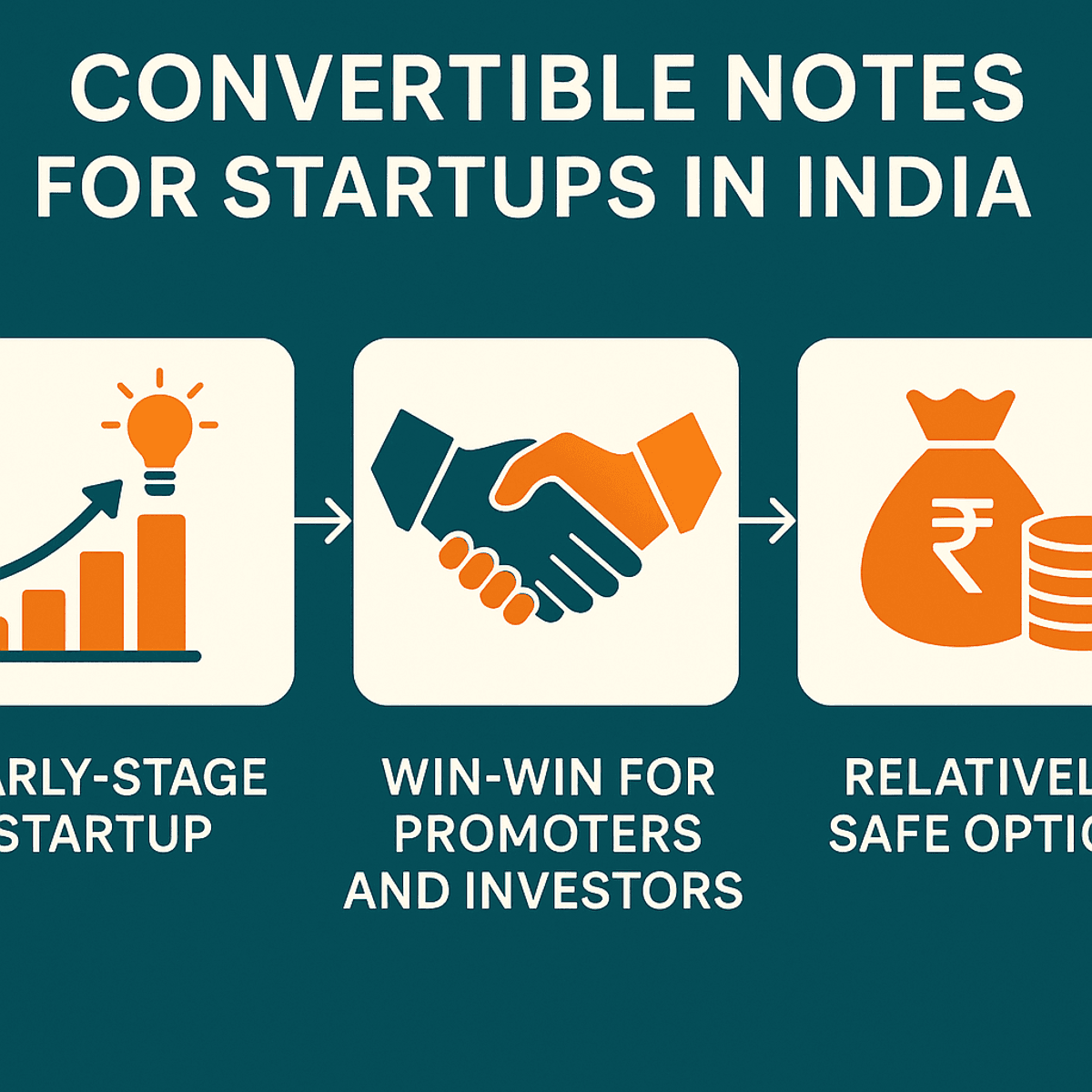A Convertible Note (“CN”) is an instrument issued by a startup company acknowledging the receipt of money initially as debt. It is repayable at the option of the investor, or convertible into pre agreed number of equity shares within a defined period, upon the occurrence of specified events or as per agreed terms.
A Compulsorily Convertible Debenture (“CCD”) is a hybrid instrument that blends the characteristics of both equity and debt. While it starts as a debt instrument, it mandatorily converts into equity after a specified period or upon the occurrence of certain events. This transition from debt to equity distinguishes CCDs from Convertible Notes (CNs), which offer optionality in conversion. Investors generally consider CCDs less risky than pure equity instruments due to their debt-like features in the initial phase.
Key Characteristics of both the instruments
| S.No | Convertible Notes | Convertible Debentures |
| 1. | Investor Optionality: This is a key feature of the instrument. The investor may seek conversion into equity or demand payment at maturity. The company cannot force conversion into equity. | Mandatory Conversion: Compulsorily Convertible Debentures are mandatorily convertible within 10 years from the date of issuance, as per Companies (Acceptance of Deposit) Rules, 2014 |
| 2. | Strict Eligibility Criteria: Only a startup company* recognized by DPIIT under the startup India initiative can issue convertible Notes. Startup Company: A private limited company incorporated or registered for less than 10 years.Annual turnover must not exceed INR 100 Crores in any financial year since incorporation.Must be working towards innovation, development, or improvement of products/processes/services, or possess a scalable business model with high potential for employment or wealth creation. | CCDs can be issued by a private limited company, regardless of recognisation as a startup by DPIIT. |
| 3. | Minimum Investment Amount: Each investor must invest a minimum amount of INR 25 Lakhs (or its equivalent) in a single tranche. | No minimum investment amount prescribed. |
| 4. | Valuation Deferral: Using CNs, the investee company can postpone the contentious process of establishing precise valuation until a later funding round. Valuation is handled implicitly through mechanisms negotiated in CN agreement. | The terms of conversion, including the ratio or formula for converting the debenture amount into equity shares, must be clearly defined at the time of issuance. If the conversion price or ratio is predetermined and fixed upfront, a valuation report from a registered valuer is generally required under the Companies Act. |
| 5. | Simple Regulatory Process: The process of issuance is comparatively simpler and faster. | Complex Regulatory Process: CCDs under the Companies Act 2013, are legally classified as debentures and must comply with Section 71 which includes shareholder approval via special resolution for issuance. Under the Insolvency and Bankruptcy Code, 2016, their treatment as ‘debt’ or ‘equity’ has been contentious, often depending on the specific agreement terms and how they are reflected in financial statements, as highlighted by the Supreme Court ruling in IFCI Ltd. v. Sutanu Sinha |
Steps to Issue Convertible Notes in India
| Step I | Draft a Convertible Notes Agreement and subsequently pass a board resolution in the board meeting to approve the Agreement and issuance of CN thereof. |
| Step II | Conduct Extra Ordinary General Meeting of members/shareholders to approve issuance of CNs |
| Step III | File eForm MGT14 within 30 days of passing the shareholders resolution. |
| Note | The issue of Convertible Notes to persons resident outside India shall be as per Chapter VIII (General Provisions), Rules 18 of the FEMA Rules and particularly a person resident outside India may acquire or transfer by way of sale, convertible notes, from or to, a person resident in or outside India, provided the transfer takes place in accordance with the entry routes and pricing guidelines as prescribed for capital instruments |
| Step IV | Issue CN to the investor |
Key Clauses in a Convertible Note Agreement
| S.No | Clause | Rationale |
| 1 | Definitions | Provides clarity on key commercial and legal terms, avoiding future ambiguity in interpretation. |
| 2 | Disbursement Conditions | Ensures investor funds are accepted only after company approval formalities, protecting regulatory compliance and fund traceability. |
| 3 | Prepayment Option | Gives the company flexibility to repay early, but may limit investor’s upside if not contractually restricted. |
| 4 | Interest Accrual | Maintains the legal character of a debt instrument while signaling intent for equity conversion rather than financial return. |
| 5 | Conversion Trigger & Discount | Balances risk-reward by rewarding early investors with conversion on a future financing event at a preferential price. |
| 6 | Conversion Mechanics | Operationalizes conversion and ensures the company is released from repayment obligations once shares are issued. |
| 7 | Transfer Restrictions | Protects the company’s cap table integrity by restricting investor from transferring the note without consent. |
| 8 | Representations & Warranties | Ensures both parties have proper authority and intent, minimizing the risk of legal challenge or misrepresentation. |
| 9 | Confidentiality | Safeguards sensitive business and deal information, especially during early or pre-funding phases. |
| 10 | Termination Triggers | Prevents indefinite legal ties by offering clear exit triggers if the transaction fails to materialize in time. |
Track Deal Comments
- If you’re a startup in its early stages and grappling with valuation uncertainties, issuing Convertible Notes can be a smart move. They offer a win-win for both sides. As a promoter, you don’t face immediate equity dilution—conversion happens only when the investor chooses to exercise that option.
- For investors, this serves as a relatively safe bet—if the venture doesn’t go as planned, they may opt for redemption and recover their principal along with a fixed interest.
- As an investor, the holder of CNs will have a limited influence; it is not particularly advisable if you wish to have voting rights in the company for your investment.
The template for a convertible note agreement is available below:
Pages: 1 2







2 Comments on “Understanding Convertible Note in India”